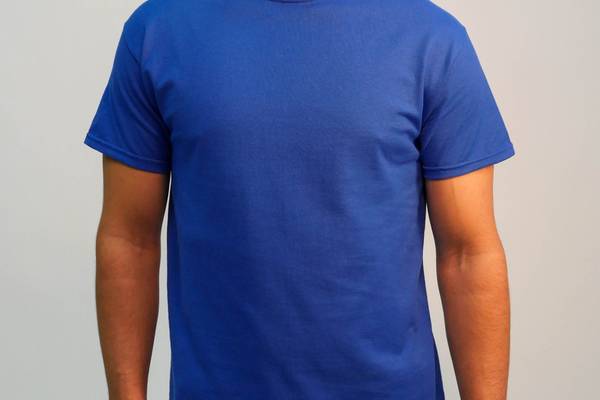
Is Polyester Breathable? (Good For Summer vs Sweaty)
When hot temperatures arrive everyone reaches for those clothes designed to keep the body cool. There are a lot of fabrics to choose from as breathability is essential in today’s fashion market. The trick is finding the ones that look good and complement your figure.
Is polyester breathable? In most forms the answer is no, polyester is a fabric to avoid when the heat is on. It does not breathe well and it does not absorb sweat very well. That means you are going to be hot and sticky if you wear polyester throughout the summer.
To learn more about polyester’s lack of breathing just continue to read our article. It has the information you need to make good summer choices. Polyester may be durable and easy to clean but it is plastic after all and that doesn’t help to keep you cool.
Is 100% Polyester Breathable?

No, in fact, this fabric has to be blended with natural fibers to add the breathability to whatever you are wearing and whatever you place on your bed. If you are trying to stay cool on those hot summer nights, go for pure cotton or other natural fibers and leave the polyester bedding for the winter.
There are polyester fabrics that are supposed to wick away the moisture from your body but it is said that those materials only work if the fabric is skin tight. Polyester is made from plastic and plastic just can’t breathe.
When you are a person who sweats more than the average person does, polyester may look good on your body but it will do nothing to keep you cool and prevent sweating. To keep cool avoid 100% polyester items especially when you want to make a great 1st impression.
This may be hard to do as so many clothes today are made with or from polyester.
Is 60 Cotton 40 Polyester Breathable?
Yes, natural fibers are often added to polyester to make sure you get some breathing when the day or night is hotter than usual. For ultimate breathability when wearing a polyester blend, make sure the natural fibers are a higher percentage than the polyester ones.
What this and other blends do is add that nice soft touch that feels so good next to your skin. Polyester usually has a more synthetic feel to it which is not always comfortable. That is why so many bedding items are blended with cotton.
You get soft bedding that lets you remain comfortable throughout the night. If you look closely at your bedding or the bedding on sale at your favorite department store, you may find that the majority of sheets and pillowcases on sale are a cotton and poly blend.
This blend gives you the best of both worlds and makes sure the sheets last. You also get softness that helps you relax and get a good night’s sleep.
Is Polyester Breathable For Masks?

This is like the 100% polyester breathing section. On its own, polyester is the worst fabric to use when trying to create a good face mask. The reason for this is that material creates moisture and that is not good when you are trying to prevent moisture from forming and spreading as you walk.
If you want a good face mask when working or avoiding spreading any germs, you need to blend the polyester with another more breathable fabric. This stops the moisture from forming, keeps you cooler without sacrificing any durability.
To make a good face mask, a lot will depend on how the fabric was made. Not only is polyester bad for face masks but so are wool scarf material, cotton bandanas, and light scarfs made from a variety of fabrics.
Also, you will want a fabric that has a higher thread count. The tighter the weave the better the mask is at preventing the spreading of germs. Yet, that fabric should be very absorbent as well as breathable.
Is Polyester Breathable For Babies?
100% polyester is not breathable and should not be used in a baby’s summer clothing. It is just the fact of the way polyester is made and no matter how you shape it or what size you make the material, it just won’t breathe for anyone.
You should go with a polyester and natural fiber blend if you want the durability of polyester in your baby’s clothing. Like bed sheets, etc., those natural fibers bring the breathing factor to your child and helps let them enjoy their day.
But there is a caveat to all of this and the next few words may alter your thinking about using polyester next to your baby’s skin. Polyester is made from toxic chemicals and not only does the heat of the sun and dryer release those chemicals, but yours or your baby’s body heat can also do the same.
That means your baby’s skin can absorb toxins if they wear polyester clothing. Wrinkle-free and durability don't translate into healthy all the time.
Can Polyester Cause Night Sweats?

Unfortunately, the answer to this question is yes it can. In fact, this problem is not limited to polyester alone. It can take place if you wear other synthetic fibers next to your skin when you go to bed.
This problem is not restricted to bedclothes but is found in the synthetic bedding you may use every night. Polyester and other synthetic pillowcases and sheets can create the night sweats and make you very uncomfortable as you rest.
With that said, do not think that polyester is the only source of the night sweats. It is just the first place to look. If you change your bedding and nightwear, and you still sweat a lot at night, you may have a health problem.
To find the source of your night sweats, you should go to your doctor and get a check-up looking at your hormones, TB, diabetes, and other ailments you may not know you have. Even sleep apnea can cause night sweats.
Changing your nightclothes or bedding is just the first and easiest step in the process.
Is Polyester Sweat-Proof?
If you mean does polyester repel sweat, then the answer would be yes. Polyester does not absorb moisture very well. That characteristic, technically, does mean that the fabric is sweat proof.
But if you mean does polyester keep you from sweating, then the answer is no. It can be a very hot fabric to wear when it is not blended with natural fiber. The sweat will stay next to your body as it does not wick away moisture that well either.
What does that mean when you have an important meeting the next and your bed is covered with polyester sheets? It means you may not get the rest you need to be sharp at that meeting. Your body will overheat and sweat will make it very uncomfortable for you to get any rest.
The best thing to do is ii reserve wearing or using polyester till the weather turns cooler. Then your body should not overheat and welcome the warmer temperatures. There is always a time and a place to use polyester fabrics.
Does Polyester Make You Sweat?

You could say that it does as polyester, in its purest form, does not let your body breathe nor allow the heat to escape. With no place to go the heat stays trapped next to your body, which then overheats and causes the sweating to take place.
To avoid this situation, make sure to buy a poly, cotton blend, or a poly and natural fiber blend. This goes for both the clothing you wear and the bedding you use on your bed. The addition of the natural fibers provides the needed breathing and comfort you are looking for.
Avoid 100% polyester at all costs when the warmer temperatures of Spring arrive and stay until the middle of the Fall. It is not a good fabric to wear or use when it is time to play in the sun.
While polyester has some great characteristics, it is not the perfect factor and its lack of ventilation means you will sweat more wearing polyester than you would if you wear natural fibers.
Does Polyester Show Sweat Stains?
In some cases, yes it will. A stretchy polyester seems to hide those obnoxious sweat stains better than other polyester fabrics. Those other polyester options are not so kind and you may be embarrassed accidentally when you are not taking the right precautions to protect your clothing from sweat stains.
Also, the lighter the color the more of a problem you will have. Sweat stains seem to be more visible when you are not wearing dark colors. The good news here is that when you get those stains, they should be easy to clean. Polyester does not hold onto stains very well, except for oil.
Your stained polyester should clean up well and allow you to wear the outfit again. When polyester was first introduced to the consumer, it was advertised as a fabric you could wear for 2 months straight. That may be the case for some polyester materials but not all as sweat has a way of making its presence known.
Does Polyester Absorb Sweat?

There is no other way to answer this question than to say, no, it does not. Polyester is made from plastic and you know how absorbent plastic is when it comes to moisture and sweat.
This material’s reputation is that it repels moisture not absorbs it. When it comes to sweat that means it remains next to your body to dripping down someplace it can pool and cause you a lot of discomforts.
Polyester and sweat do not go together very well unless you find a version that was designed to wick away moisture. Even if you find that alternative polyester fabric, the wicking away of the moisture may not be that good.
Be selective and be prepared to be uncomfortable if you pick up a 100% polyester clothing item. You will not remain dry if you do and your romantic encounter may not go off as planned.
Is Polyester Good For Summer?
No, it is not. It is one of the fabrics that everyone says you should avoid when the summer heat comes. Polyester is more of a cold-weather fabric, even if it is blended with natural fiber.
Summer heat and polyester do not go well together because polyester is not good at absorbing moisture. Nor is it good at wicking away that moisture. Instead, it is very good at letting moisture and heat stay next to the body or pool up ion some very uncomfortable spot.
Even if blended with natural fibers, those latter fibers can hide on you and let the polyester be the dominant fabric in that blend. While you get a little more breathability when blended with natural fibers, it is best to avoid wearing polyester when the day is going to be hot.
There are a lot better fabric choices in your closet, even if your co-workers have seen the outfit already that week, than wearing polyester in the summer. Polyester is good for wear and tear not summer heat.
Some Final Words
When this material was invented, it was because the inventors were looking for a tough fabric that lasted along time. They were not looking at breathability as being the main characteristic. That is one reason why polyester does not breathe very well.
It is made t last you and save you some money. That is if you want toxic plastic materials next to you and your family’s skin. Polyester does have its place, finding it takes some time.

